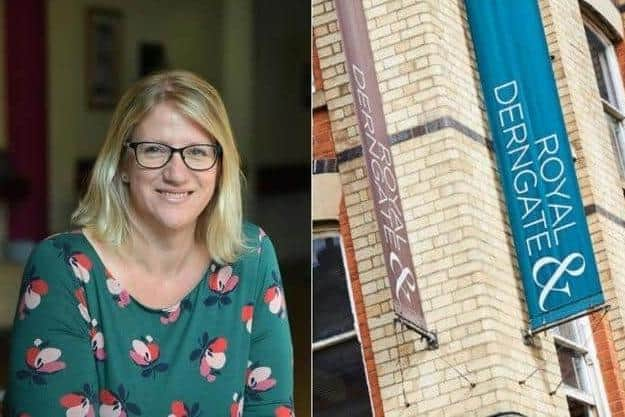Royal & Derngate’s CEO ‘deeply saddened’ by discovery of RAAC in building foyers leading to immediate closure
and live on Freeview channel 276
Following the news that the Royal & Derngate building will be closed until the end of September after the discovery of RAAC, the chief executive says she is “deeply saddened”.
Advertisement
Hide AdAdvertisement
Hide AdJo Gordon, chief executive of Northamptonshire Arts Management Trust and its venues, said: “We are deeply saddened by this discovery and to have to close our doors at this time, particularly as September is usually an incredibly busy and important time for the theatre.


“We are keenly aware of the disappointment that this will cause to audiences, visiting companies and our staff alike, though we know they’ll understand that their safety is always our primary concern.
“We look forward to welcoming everyone back as soon as possible and updating further as soon as we are able.”
The discovery of RAAC at the Derngate comes after a building survey took place, which found the concerning building material was present in the foyers.
Advertisement
Hide AdAdvertisement
Hide AdIn line with recent government health and safety guidance, both the Royal and Derngate auditoriums and Northampton Filmhouse have had to close with immediate effect.
A statement on the Royal & Derngate website reads: “We are working urgently with our landlords, West Northamptonshire Council, to investigate and plan remedial works and are asking for patience while we do so.
“The safety of our audiences and staff is paramount and therefore it is essential that the situation is assessed fully before audiences return. Our staff will work from home for this period.
“Bookers for shows until the end of September will be contacted in the coming days and where possible we are rescheduling events and performances.
Advertisement
Hide AdAdvertisement
Hide Ad“Bookers for films will be contacted as appropriate. We are asking that bookers wait to be contacted rather than contacting our box office directly, as they will be working to get to people with the earliest bookings first.”
A comment issued to this newspaper by Councillor Jonathan Nunn, leader of West Northamptonshire Council, confirmed the council has been assessing its buildings for the presence of RAAC since July 12 as concerns about the material increased.
The process was accelerated following the government’s announcement last week about the heightened dangers of the material in buildings, which has now led to the immediate and temporary closure of the Royal & Derngate.
What else do we know about Reinforced Autoclaved Aerated Concrete (RAAC)?
The material is described as a “lightweight form of concrete” and was used in the construction of public buildings between the 1950s and 1970s. However, it is made in a way that makes it “much weaker” than traditional concrete, says the Standing Committee on Structural Safety.
Advertisement
Hide AdAdvertisement
Hide AdThe Department for Education has been providing guidance and funding to manage the potential risks of RAAC since 2018, but new cases have made them “less confident” that buildings containing the material should remain open without extra safety measures in place.
Following the news of the discovery of RAAC in buildings, the Department for Education’s X account has provided background on the matter and said: “In cases as recent as August, buildings containing the material have failed unexpectedly, requiring decisive action in order to keep staff and pupils safe.”
